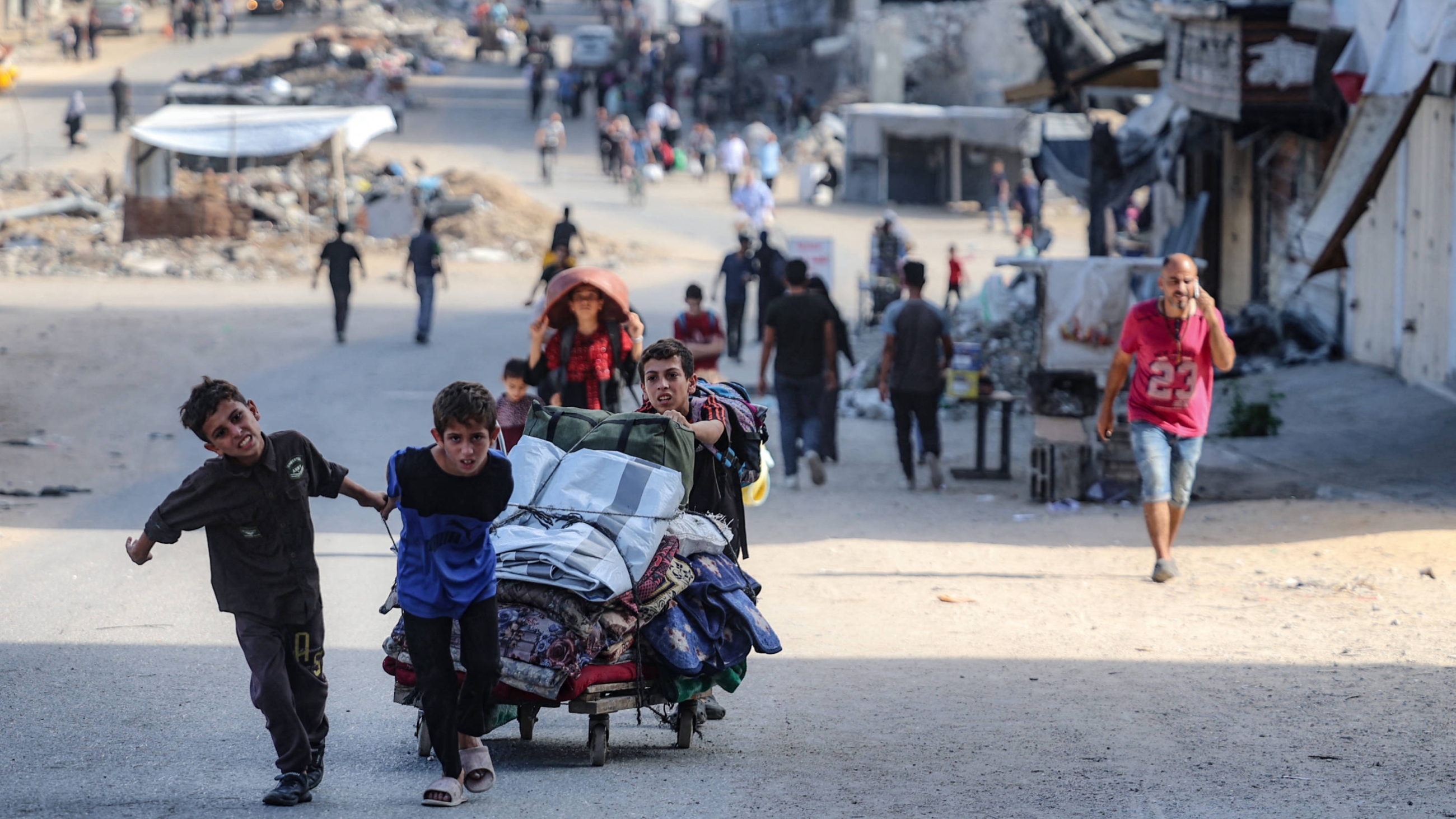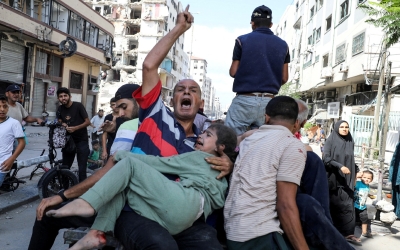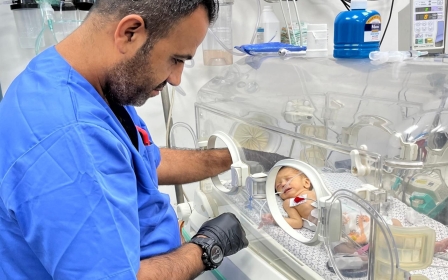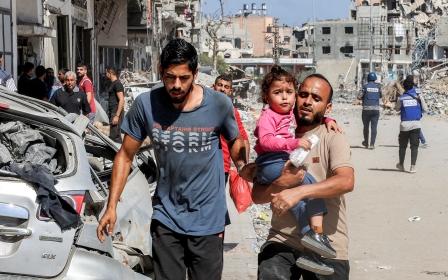Northern Gaza residents refuse to go south as Israeli army deepens incursion

A large number of Palestinians in northern Gaza are refusing to comply with expulsion orders by the Israeli military as troops make deeper incursions into northern Gaza.
Israel has ordered the full evacuation of northern Gaza’s remaining 400,000 people since the start of a major ground operation in the area on 6 October.
Israeli forces widened their raid into northern Gaza over the weekend, and tanks reached the north edge of Gaza City, bombing a number of districts of the Sheikh Radwan neighbourhood.
An Israeli drone on Sunday killed five children who were playing near a cafe in the al-Shati area in northern Gaza on Sunday, the Palestinian news agency Wafa reported.
At least 300 people have been killed there since the start of the offensive nine days ago, according to the Palestinian health ministry. The ministry also said many dozens of people are feared dead on roads and under the rubble of houses beyond the reach of medical teams.
New MEE newsletter: Jerusalem Dispatch
Sign up to get the latest insights and analysis on Israel-Palestine, alongside Turkey Unpacked and other MEE newsletters
Residents told Reuters that Israeli forces had effectively isolated Beit Hanoun, Jabalia and Beit Lahia in the far north of the enclave from Gaza City, blocking access between the two areas except upon their permission for families willing to heed evacuation orders and leave the three towns.
The Israeli army has also placed the densely populated refugee camp in Jabalia under total siege, cutting it off from Jabalia City.
While a significant number of families have been forced to leave their homes due to the ferocity of the attacks, many have decided to stay in their homes, believing that heading to southern Gaza is not a safe or better option for them.
“Despite the terrifying situation and the deafening sound of explosions, people here, particularly in Jabalia, are not budging from their homes,” a journalist in Gaza City told Middle East Eye.
“Residents of the north are saying they would sooner die in the streets than leave to the south. People in the south tell us that while death is the same everywhere, life in the south is unbearable. They are living in tents and in humiliation.”
The journalist said that residents of the north were going hungry, with the remaining food supplies coming from limited aid distributions of what was already in northern Gaza before the start of the new offensive. The United Nations says no food has entered northern Gaza since 1 October.
The journalist and 13 members of his family, including his siblings, are sheltering together in one home in the centre of Gaza City. The pervasive fear among them is the Israeli military fully encircling the city.
“The ground invasion is the worst and ugliest thing. The sound of tanks as they move at night is terrifying and the sound of their shelling is terrifying,” he said.
“For the past four nights, the Israeli army has launched flare bombs that illuminate all of Gaza City, which has also been very stress-inducing.”
'The general's plan'
The journalist believes that the refusal of residents to leave their homes in Jabalia, Beit Lahia, Gaza City and Beit Hanoun, might make it “harder on the Israelis to implement their plans” in the north.
Palestinians fear that the Israeli army is in the process of laying the groundwork for what has come to be known as the "general’s plan", which aims to depopulate northern Gaza, with those choosing to remain deemed legitimate military targets.
'Residents of the north are saying they would sooner die in the streets than leave to the south'
- Journalist, northern Gaza
Conceived by retired Major-General Giora Eiland, "the general's plan", which was proposed in an Israeli TV campaign in September, called for the ethnic cleansing of the north, warning that those that remained would face starvation.
The Israeli newspaper Haaretz on Saturday said that the Israeli government was no longer seeking to revive talks to secure the release of hostages and was now pushing for the gradual annexation of large parts of the Gaza Strip, according to senior defence officials.
The newspaper quoted army commanders in the field as saying that the decision to launch the major offensive in northern Gaza was made without thorough deliberation, adding that the apparent objective was chiefly to pressure residents to leave.
According to the report, troops were ordered to conduct the operation without any intelligence to justify it. The decision was taken even as the Shin Bet security service warned that it might risk the lives of hostages.
Residents of the Jabalia refugee camp have told Middle East Eye that dozens of bodies have been rotting in the streets with no one able to reach them or identify them.
“People who went out were shot and killed; their bodies were left in the streets. No one was able to reach them - no ambulance or civil defence,” Abed Ali, a camp resident, told MEE.
'From one combat zone to another'
Unrwa chief Philippe Lazzarini earlier this week said that the intensified military operations were forcing the agency to “shut down lifesaving services”, adding that only two out of eight water wells in Jabalia were still operational.
Residents and hospitals are reporting that food, water, fuel, firewood and medical supplies are dwindling fast.
On Tuesday, the Israeli military issued expulsion orders for three major hospitals in northern Gaza - Kamal Adwan, al-Awda and the Indonesian hospital - trapping over 300 critically ill patients, according to the UN.
Kamal Adwan has since been under Israeli siege, with live ammunition and smoke grenades firing in its vicinity.
In a Facebook post, Palestinian journalist Abdel-Salam al-Hayek, from northern Gaza, said that across the Gaza Strip, people had nowhere to flee bombardments because they would be "fleeing from one combat zone to another".
"Two million people are being chased into a narrow space where there is no safe place or any of the necessities of life, and buildings, tents, streets and cars are being bombed without warning and without discrimination," Hayek wrote.
"They are also being bombed while they are collecting their remains, while they are burying their dead, while they are in their hospital beds, and while they are fleeing from one place to another under the bombardment."
Middle East Eye delivers independent and unrivalled coverage and analysis of the Middle East, North Africa and beyond. To learn more about republishing this content and the associated fees, please fill out this form. More about MEE can be found here.





